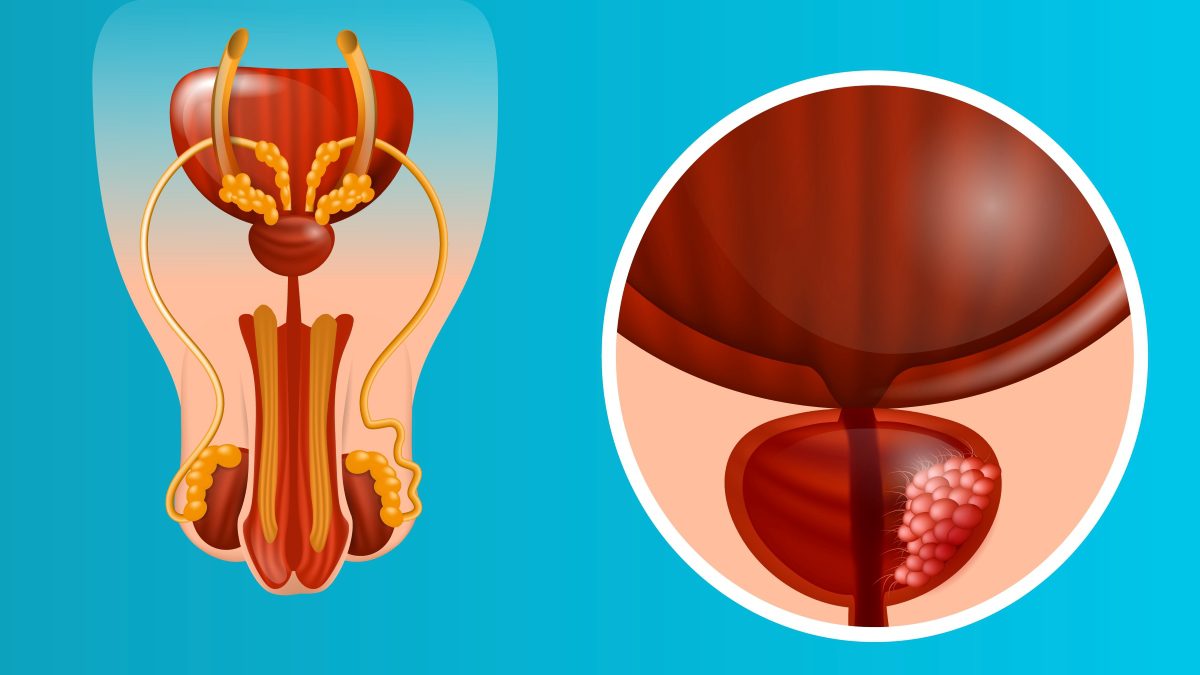Definition
In prostate cancer (or prostate carcinoma), cancerous growth develops in the prostate. Metastasizing (spreading of cancer cells outside the prostate) is possible. Initially, there may be no symptoms. However, as it progresses, it can cause bloody urine, difficulty urinating, pain in the pelvis, back or when urinating (similar symptoms as benign prostatic hyperplasia have). Additionally, you can feel tired due to low levels of red blood cells. Factors of increased risk of prostate cancer include a family history of the disease, older age, race (African-American people are at higher risk), obesity, and diet (diet high in red meat, processed meat or milk products or low in certain vegetables). A biopsy can reveal prostate cancer.
Also, prostate-specific antigen testing can be used for screening. It increases cancer detection but does not decrease mortality.
Causes of prostate cancer
Prostate cancer occurs when some prostate cells become abnormal. DNA mutations in abnormal cells cause them to grow and divide faster than normal cells. There is a possibility for cancer cells to spread (metastasize) to other parts of the body.
Symptoms
Prostate carcinoma may appear symptomless in its early stage.
More advanced prostate cancer may cause symptoms such as:
- Bloody semen
- Weak urine flow
- Problems with urinating
- Discomfort in the pelvic area
- Erectile dysfunction
- Pain in the bones
When to see a doctor
It’s better to see a doctor if you found any symptoms or signs of prostate cancer. Your doctor can help you determine the best method for screening for prostate cancer and diagnosing it.
Diagnostics
Usually, doctors make two initial tests in the absence of any symptoms. First is the digital rectal exam, when the doctor tries to find a+nd feel any nodules on the prostate through the rectum. The second test is a blood test that can show “prostate-specific antigen” (PSA) – a substance made by the prostate. However, a blood test may not confirm the diagnosis. Therefore, it is possible to have a normal PSA level even if you have prostate cancer, while elevated PSA can indicate a healthy prostate.
Biopsy of the prostate is the only diagnostic method that can confirm prostate cancer. A biopsy involves obtaining a tiny sample of tissue from the prostate and examining it under a microscope.
In addition, you will discuss your medical history with the doctor. A family history of urinary and genital diseases can help the doctor make a more precise diagnosis.
Prostate cancer treatment
Early-stage prostate cancer treatment
Localized and small cancers are usually treated by the following methods:
- Watchful waiting – not immediate treatment applies, only regular monitoring of PSA blood levels.
- Brachytherapy – implantation of radioactive seeds into the prostate.
- Radical prostatectomy – removal of the prostate via surgery.
- Conformal radiotherapy – to minimize healthy tissue exposure, the radiation beams are focused in such a way that the region of their overlapping is close to the shape of the organ or area that requires treatment.
- Intensity-modulated radiotherapy – using beams with variable intensity. A computer-controlled linear accelerator usually delivers an advanced form of conformal radiation therapy.
More advanced prostate cancer treatment
A combination of radiotherapy and hormone therapy may be needed to treat more advanced prostate cancer. During the course of radiotherapy, patients are treated on an everyday basis for up to eight weeks. Also, a doctor may advise making a radical surgery – the removal of the prostate gland. Robotic keyhole surgery is considered more advanced than traditional surgery due to the shorter recovery period. Unfortunately, for elderly patients, even robotic keyhole surgery might not be an ideal option.
Hormone therapy can greatly slow down or even stop the progression of prostate cancer in advanced stages.
Scientists found that estrogen delivering through skin patches can be used to treat prostate carcinoma safely and effectively. Moreover, scientists discovered that prostate cancer patients who receive radioactive injections have a longer life expectancy.
Prevention of prostate cancer
Diet and lifestyle
There is a relation between prostate cancer of the Western diet. In addition, there is evidence that advanced prostate carcinoma is associated with high calcium intake.
Also, there is an association between vegetarian diets and lower prostate cancer rates. For example, consumption of soy, beans, legumes, and cruciferous vegetables may be related to a lower risk of advanced prostate cancer.
Managing symptoms and side effects
If your doctor prescribed you medicine to treat symptoms or side effects, take it as directed. In addition, a healthy diet and lifestyle can reduce symptoms and side effects.
Here are some tips to help:
- Pain. Many home treatments can relieve pain.
- Vomiting or nausea. It may be beneficial to eat smaller meals. You can also take ginger tea or ginger candy to help. Be aware of and treat symptoms of dehydration as early as possible.
- Constipation. Before consulting with a doctor, avoid taking laxatives. You have to drink enough fluids and eat fibre (vegetables, fruits, whole grain food) in your diet each day.
- Diarrhea. You should consult with your doctor before taking any medicines to treat diarrhea. Also, make sure to drink enough liquid to escape dehydration.
- Sleep problems. Avoiding caffeine in the evening, regular bedtime, and exercise can help deal with sleep problems.
- Urinary problems. You can overcome urinary incontinence by avoiding caffeinated drinks and setting a urination schedule every 3 to 4 hours. Kegel exercises can also help by strengthening pelvic muscles.
Managing stress
- For someone, it’s helpful to talk with friends or family to reduce stress. Someone wants one-to-one time with themselves. Additionally, you may find it helpful to meet with a support group or a counsellor.
- In addition, your doctor may advise you of other sources of information and support.
- Yoga, visualization exercises, and other methods of relaxation may also help you to deal with stress.
Complications
- Erectile dysfunction
- Incontinence
- Metastasis
- Metabolic factors
















Leave a Reply
You must be logged in to post a comment.